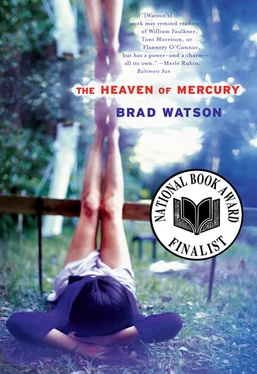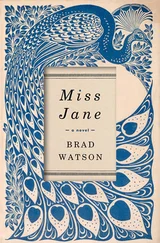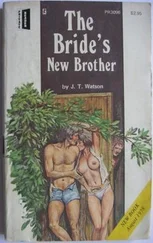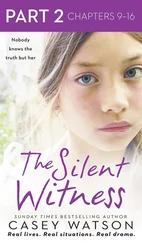— Well we doin’ all right here Oscar what you been up to?
— Oh nothin’ much Mr. Junie I guess I been busy with this’n’that, here’n’there.
— Well I just thought I’d bring the chulluns out to say hello to you, Oscar, it’s Sunday.
— Well they looking mighty fine Mr. Junie, mighty fine!
— Y’all say hello to Oscar now.
Hello hello hey they peeped, barely audible.
— Y’all want to touch old Oscar? You want to feel of his leg?
Silent, little heads barely waggling no, big eyes stuck on the dummy, hands clutching one another’s hands, and little Robert holding tight to Creasie’s.
— Well I reckon we better get on back to the house Oscar, is there anything I can get you, anything you need?
— No sah Mr. Junie I don’t need a thing!
— All right now.
And gently he would shoo them out and cre-e-e-eak the door would gently shut and rattle the lock back onto the hasp and she, Creasie, would be staring at the door and directly one of the children would always ask, GranPapa, don’t he mind being shut up in that shed all the time?
— Oh, no, Mr. Urquhart would say, old Oscar is a happy nigger. And she thinking how horrible it would be to be locked up in the dark like that all the time, dummy or no, it gave her nightmares, she’d be locked in there with him and he’d turn his old head at her and his awful red lips and white teeth would make her cry out in her sleep. He was going to bite her head off.
And then he’d taken her out there one Sunday afternoon Miss Birdie and Mr. Earl and the children gone into town, and she was going to head down to the ravine and see her mama but then he come driving up in his old automobile without honking the horn, had been to town but come back, said he’d thought she might be wanting a ride in. She said, — Thank you, sir, I’ll get my things from the cabin, and he followed her halfway there, stopping at the shed. She comes back and the shed door’s open, he’s in there, calls out, — Hey, Creasie, come here and help me with something. And when she steps in there he closes the door, nothing but dark and a cleaver blade of light through the black, across the dummy, and old Mr. Urquhart begins to run his hands all over that dummy, showing her this and that, though you could hardly see in there, just that blade of light from the door ajar. Then saying, — See this here plug in his heel here, this here’s an electric nigra, and then saying, — Why look here, I do believe this’s a horny old nigger here, too, my my I believe just the sight of you has put a spark in him, got him all worked up! — No, sir, she said, I don’t think he all worked up. -Oh, I believe he is, Mr. Urquhart said, and then he’d started doing something else — to her. He pushed her up against the wall and began to run his hands over her, and grabbing her, she was too frightened to breathe. When he pushed her down onto the floor of the shed she shouted and struggled, but he held her down and yanked at her clothing, and then he was lying heavy on her and pushing himself into her, the pain first sharp and hard down there and then cutting into her brain behind her eyes, and all the time looking up at that wide-eyed dummy up on the shelf, his amazed eyes wide open and dull in the blade of light from the door, and after what seemed a long time, a loud roaring in her head receded slowly into a distant noise and she heard a sound, a tic tic tic, and she could see a little gold chain disappearing into the little pocket in his vest which had ridden up on him and was close to her eye, a tic tic tic of the hidden watch in there, though this moment seemed outside of time, so that when he was at some point up and off of her and she was lying on the floor of the shed, she couldn’t have said how long she’d been lying there just staring at the dummy, not in her right mind. She said,
— You didn’t see nothing.
Dummy didn’t even blink.
— Son of a goddamn bitch! she heard old Mr. Urquhart say outside the shed door, his pocket change and belt buckle tinkling. And then in a softer voice, — Little nigger bitch, just talking to himself. -Bled on me like a stuck pig.
— I been stuck, she would say to herself later, when the capacity for reason had slipped back into her like waking up from a dream, but you the pig.
She heard him jingle off with his coins and keys. Heard the car start up. Heard him call out in a minute, — Come on, now, I’ll take you to town! Heard nothing but the car motor for a while. Heard the car door shut and heard him drive away. The dummy sat there.
She said, her voice strange to her own ears, — Why don’t they plug you into the electric? I know what you’d do. Go kill them all. Cut they throat.
She lay there a long time no longer in pain, as if drugged or drunk, and then pain came back dull at first and then sharp and an ache all over. She gathered herself best she could and hobbled back to the little cabin and washed up, changed clothes, and put a bunch of rags in down there, found a powder and took it and lay down awhile, and since it was too late by then to go to the ravine she figured she’d better go on back over to the house and fix supper, since Miss Birdie and Mr. Earl and the children would be back soon. And that day, wasn’t too cold for a day in December, but nearly dark at five o’clock, she finally gets back to the house, walking slow, hurting, a wad of rags stuffed into her drawers, and Miss Birdie is in there rushing about with supper.
— Creasie! she says. -Where have you been? Hurry up and help me here with supper before Mr. Earl throws a fit. And so she pitched in, feeling like the whole world was dark dark outside the kitchen in which they labored, feeling like she might faint anytime, and when she heard a car crunch up in the drive and heard old Mr. Junius hail from the driveway she slipped out the kitchen door and ran back to her cabin and wouldn’t come out at all that evening though Miss Birdie called her from over there, called out two or three times, but she lay in the dark that was the whole world outside that little bit of light in the kitchen across the yard that even itself was fading now into nothing.
AUNT VISH KNEW the herbs, and when Creasie missed her period she went to the ravine to see her. Vish gave her a smelly green potion in a little wooden cup, told her to drink it and wait twenty-four hours there in her little cabin next door, where Creasie’s parents had lived when she was born, before her mother died and her father left her with Vish and went away. The next morning, Creasie left whatever there was in her of Junius Urquhart in a hole she dug in the loamy ground next to the creek at the bottom of the ravine. She never let herself get lured back to the shed again, never saw that dummy again but in her nightmares. Staring at her like he did the whole time it was happening. She tried to blank it out of her mind.
But she had nightmares all that year, after. She was still having them the night Frank came in through the window, silent as a ghost.
She was sleeping in her nightgown on top of the sheets, hot, having the dream, and woke herself trying to cry out. It took her a second to know where she was. She cleared her throat and had reached down to pull the covers up over herself when she saw him sitting there in the chair across from the foot of the bed in the wooden chair, black but for the faintly gleaming whites of his eyes, and screamed. He was up and onto her in half a second and had his hand over her mouth, whispering — Shut up now, I ain’t going to hurt you, I ain’t going to do nothing to you, hush up.
It was dark, he was flesh and blood, holding a big hard hand over her mouth. He was flesh and blood but for a second all she could think was the dummy. He took the hand away when her breathing slowed enough so he must have trusted her not to scream and they lay there like that, his breath on her hot and sour, smelled like liquor and a fresh-cut pine tree. He held her shoulder bones with big knotty hands and looked away as if listening for something, then his big eyes turned her way and he looked at her.
Читать дальше












